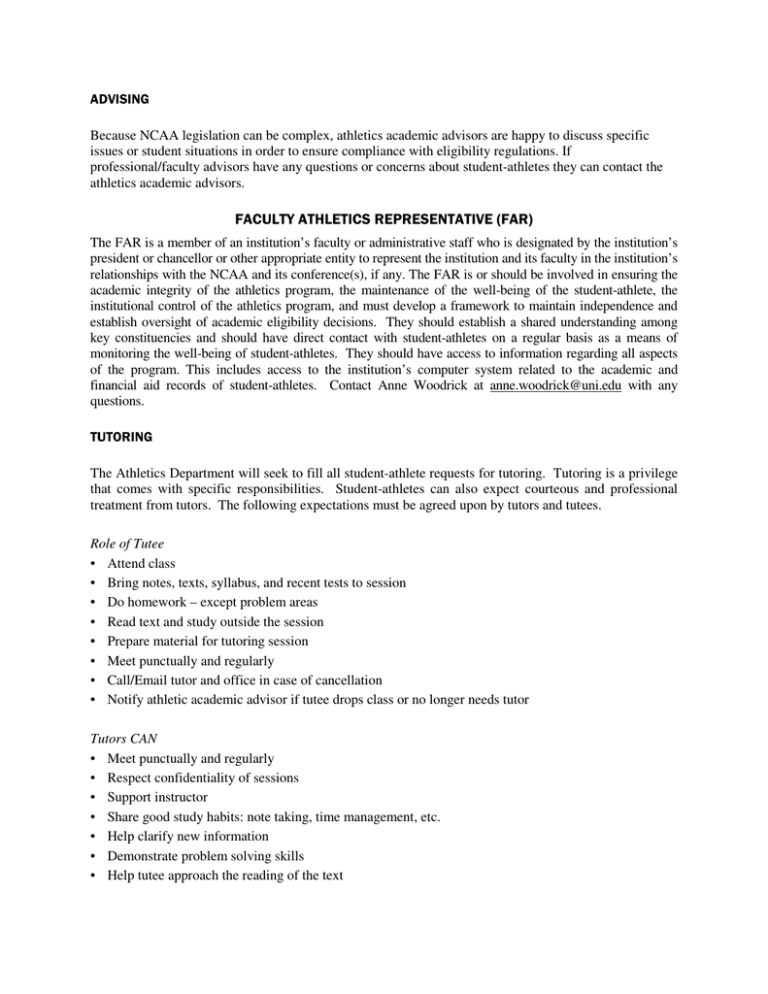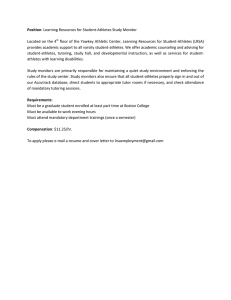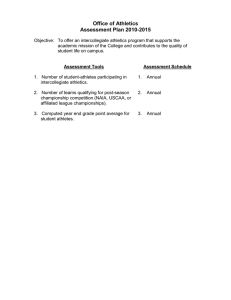ADVISING Because NCAA legislation can be complex, athletics academic advisors are...
advertisement

ADVISING Because NCAA legislation can be complex, athletics academic advisors are happy to discuss specific issues or student situations in order to ensure compliance with eligibility regulations. If professional/faculty advisors have any questions or concerns about student-athletes they can contact the athletics academic advisors. FACULTY ATHLETICS REPRESENTATIVE (FAR) The FAR is a member of an institution’s faculty or administrative staff who is designated by the institution’s president or chancellor or other appropriate entity to represent the institution and its faculty in the institution’s relationships with the NCAA and its conference(s), if any. The FAR is or should be involved in ensuring the academic integrity of the athletics program, the maintenance of the well-being of the student-athlete, the institutional control of the athletics program, and must develop a framework to maintain independence and establish oversight of academic eligibility decisions. They should establish a shared understanding among key constituencies and should have direct contact with student-athletes on a regular basis as a means of monitoring the well-being of student-athletes. They should have access to information regarding all aspects of the program. This includes access to the institution’s computer system related to the academic and financial aid records of student-athletes. Contact Anne Woodrick at anne.woodrick@uni.edu with any questions. TUTORING The Athletics Department will seek to fill all student-athlete requests for tutoring. Tutoring is a privilege that comes with specific responsibilities. Student-athletes can also expect courteous and professional treatment from tutors. The following expectations must be agreed upon by tutors and tutees. Role of Tutee • Attend class • Bring notes, texts, syllabus, and recent tests to session • Do homework – except problem areas • Read text and study outside the session • Prepare material for tutoring session • Meet punctually and regularly • Call/Email tutor and office in case of cancellation • Notify athletic academic advisor if tutee drops class or no longer needs tutor Tutors CAN • Meet punctually and regularly • Respect confidentiality of sessions • Support instructor • Share good study habits: note taking, time management, etc. • Help clarify new information • Demonstrate problem solving skills • Help tutee approach the reading of the text Tutors CANNOT • Do homework assignments • Take tests for tutees • Teach a course in place of the instructor • Provide typing services for tutee • Take money from the tutee for tutoring • Violate NCAA regulations If you would like to request a tutor, contact your athletic academic advisor. PROGRESS TOWARDS DEGREE Freshman Year Sophomore Year Junior Year Senior Year 5th Year Senior End 1st Year (2 sem)/ Begin 2nd Year (3rd sem) End 2nd Yr (4 sem)/ Begin 3rd Yr (5th sem) End 3rd Yr (6 sem)/ Begin 4th Yr (7th sem) End 4th Yr (8 sem)/ Begin 5th Yr (9th sem) (If necessary) (Pass 24 hrs. for PTD) 40% Degree Requirements: Non-Tchg (120) = 48 hrs. B.S.(126) = 50.4 hrs. Teaching & B.M. (130) = 52 hrs. 60% Degree Requirements: Non-Tchg (120) = 72 hrs. B.S. (126) = 75.6 hrs. Teaching & B.M. (130) = 78 hrs. 80% Degree (within 30 hours of Requirements: graduation) Non-Tchg (120) = 96 hrs. B.S. (126) = 100.8 hrs. Teaching & B.M. (130) = 104 hrs. TIME COMMITMENTS No class time should be missed for practice, weight training, injury rehabilitation, or academic support sessions. Travel for away competition is excused per the university missed class policy. MISSED CLASS POLICY This policy outlines expectations and responsibilities of students and faculty members when educationally appropriate activities require students to be absent from classes. The responsibility for attending classes rests with the student. As the citizens of Iowa have every right to assume, students at UNI are expected to attend class. It is the expressed focus of the University of Northern Iowa to further the educational development of its students. On occasion, events will necessitate a student’s absence from class. In order for both faculty and students to effectively plan for these absences, the following procedures are recommended. • All parties involved should be made aware of scheduled absences well ahead of the date(s) of absence. • In the case of extra-curricular activities, a semester-long schedule should be prepared and distributed at the beginning of the semester. In instances where semester-long schedules are not feasible, two weeks written notification shall be given for all absences. This notification shall take place even if the absence is potential rather than definite. • Students and faculty shall mutually agree as to how assignments, lectures, exams, etc. shall be made up. The type and extent of make-up work shall be at the discretion of the faculty member. • Faculty shall not penalize a student for missing a class or exam for an educationally appropriate activity, including university sponsored or sanctioned events. • If two weeks notice cannot be given: students, faculty, and others concerned should work closely together to ascertain whether special arrangements can and/or should be made. • Where situations of irreconcilable disagreement occur which are not resolved at the department level, a panel comprised of the Vice President for Academic Affairs, or that officer’s designee, the Department Head of the academic department involved, and a representative of the extra-curricular program (where applicable) shall meet at their earliest convenience with the faculty member and the student to mediate the matter. CHAMPS/LIFE SKILLS CLASS The mission of the NCAA is to maintain intercollegiate athletics as an integral part of the campus educational program and the student-athlete as an integral part of the student body. With this in mind, the CHAMPS/Life Skills Program was created to support the student-athlete development in five areas: academics, athletics, personal development, career development and community service. UNI became a part of the CHAMPS/Life Skills program in 2000. In the process of achieving this mission, the CHAMPS/Life Skills Program will: • Promote student-athletes' ownership of their academic, athletic, career, personal and community responsibilities. • Meet the changing needs of student-athletes. • Promote respect for diversity and inclusion among student-athletes. • Assist student-athletes in identifying and applying transferable skills. • Enhance partnerships between the NCAA, member institutions and their communities for the purpose of education. • Foster an environment that encourages student-athletes to effectively access campus resources. • Encourage the development of character, integrity and leadership skills. All new incoming freshmen student-athletes at UNI must register for the CHAMPS/Life Skills class, 440:059. EXIT INTERVIEW Each year, Division I institutions are required by NCAA regulations to interview student-athletes in all sports who will no longer be participants in the athletic program (e.g., graduation, transfers). The purpose of the interview is to find out how student-athletes perceive their experience at the University of Northern Iowa. The information is used to help the University determine the strengths and weaknesses of programs and to help decide where changes or improvements should be made. Actual interview responses are kept confidential and anonymous, to be read only by athletic administrators.

